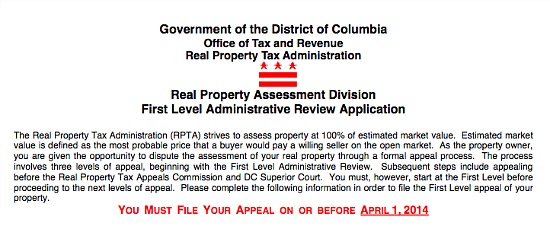What's Hot: Did January Mark The Bottom For The DC-Area Housing Market? | The Roller Coaster Development Scene In Tenleytown and AU Park
 A Home's Worth? Appealing a DC Property Tax Assessment
A Home's Worth? Appealing a DC Property Tax Assessment
✉️ Want to forward this article? Click here.

This article was originally published in March 2011, but we are re-publishing it for those DC homeowners who wish to appeal the property tax assessments that will arrive in their mailboxes this week.
Last March, Molly Scott and her husband Kevin Caldwell opened a piece of mail from the DC Office of Tax and Revenue to an unwelcome surprise. The city had assessed their Bloomingdale row house condo at $65,000 more than it had been worth the year before — a mistake that could potentially cost them thousands of dollars in property taxes.
Sound familiar? Earlier this month, an annual tradition replayed itself in households all over the District: homeowners greeted their proposed 2012 home assessments with various cries of happiness, satisfaction, or, frequently, indignation. The assessments, which are the city’s attempt to assign value to real property in order to levy the appropriate taxes, are often downright inscrutable: it’s not uncommon for one home’s assessment to go down while a comparable dwelling several blocks away winds up increasing in value.
Efforts by the Office of Tax and Revenue (OTR) to determine a home’s value are, apparently, almost as complex as Google’s storied algorithms. The agency plugs information garnered from sales data, construction permits, field visits, and existing land values into a “multiple regression analysis” to figure out the house’s value, factoring in everything from the building’s size, quality, location, and construction materials to extras like a back porch, a new bathroom, or a finished basement.
“Dozens of different characteristics are analyzed in this process, and factors and rates for each are developed to calculate the value of the buildings,” OTR spokesperson Natalie Wilson relayed via email. Still, the average citizen may never grasp exactly why their house’s value increased by five percent while their neighbor’s went down by two percent.
But luckily, for those homeowners whose assessment seems egregiously high, DC has an appeals process that’s somewhat streamlined and relatively effective. The red tape isn’t terrible, and roughly one in five appeals results in a lowered assessment, according to OTR. The key, though, for any homeowner determined to try it, is persistence, as the process includes three different stages and can take months from start to finish (the deadline for the first step is April 1st).
Scott and Caldwell can testify to the need for patience and persistence. In fact, last year wasn’t the first time they’d had a dispute over their property assessment. The year before, the pair had just gotten their home reappraised as part of refinancing their mortgage when they received the assessment notice, which put the home’s value $100,000 higher than the appraisal.
(Note: The terms “appraisal” and “assessment” are often confused: an appraisal is conducted by a private professional to determine a home’s market value, while an assessment is done by a municipality in order to levy taxes on the property. The two figures are often close, but are not usually the same.)
Scott, 34 and a landscape architect, explained that if the bank hadn’t required a reappraisal she and her husband wouldn’t have known the discrepancy was so large. She and Caldwell, a 41-year-old researcher, bought their condo in 2006, at the top of an overheated real estate market, so they weren’t surprised that the value had gone down three years later. But it appeared that OTR saw things differently.
Scott and Caldwell’s first step in appealing was to follow the directions at the bottom of the assessment letter, which directed them to fill out and send in a form outlining their case, also known as a first-level appeal. Weeks later, they received notice that they had lost, but were given the opportunity for a second-level appeal, which is a hearing with DC’s Board of Real Property Assessments and Appeals, an 18-member commission composed of private real estate professionals.
The couple hadn’t submitted any attachments on their first-level effort, but Caldwell brought the appraisal documents with him to the hearing, and subsequently won the case. “The [adjusted] assessment was still $50,000 more [than the appraisal], but they reduced it to the previous year’s level,” explained Scott.
Fast forward to March 2010 when Scott and Caldwell’s assessment was, once again, way up. So, the couple went through the appeals process again. This time, though, they lost both first and second-level appeals. “We made a mistake,” said Scott, explaining that they supplied sales data for comparable homes, but OTR deemed the comps old, and they weren’t all from Bloomingdale.
That left a final option: a third-level appeal, which is a hearing through the DC Superior Court. This time, Scott and Caldwell got serious, contacting neighborhood real estate agents to gain up-to-date sales prices on nearby homes, and combing OTR’s online real property database to find assessment numbers for comparable Bloomingdale homes. In this case, “comparable” was crucial, as the couple’s condo, a four-bedroom unit that comprises the upper levels of a row house, isn’t common in the neighborhood. In fact, Scott and Caldwell thought the assessor’s unfamiliarity with the unit might be part of the reason it was being assessed so high.
The hearing included the assessor plus two arbitrators. “We presented our case and [the assessor] presented his,” remembered Scott. “We said that we didn’t know where they were getting their numbers from; based on the sales we’d seen in the neighborhood, you could buy an entire house for what they were assessing our condo at.”
The arbitrators seemed sympathetic to the couple and ruled in their favor, reducing the assessment to the previous year’s adjusted figure. Scott and Caldwell received the decision by mail just a few days later. By then, it was the end of November, more than eight months after they’d begun the process.
Homeowners combating a way-too-high assessment should first make sure all the details about the home listed in the assessment letter are correct. After that, including a professional appraisal or timely comps on nearby home sales in the appeal is probably the best way to proceed. Scott added that a supportive community can provide a real boost, too; a neighborhood listserv can be a vehicle for soliciting advice and resources, and an active ANC commissioner might be able to help if the process gets stuck.
At this point, she and Caldwell are becoming veterans: their new assessment for the 2012 fiscal year, which they received a couple weeks ago, was once again roughly $65,000 higher than the prior year’s figure.
The two, who are planning once again to appeal the assessment, say they have no idea why OTR continues to over-value their house without taking note of the previous years’ adjustments. “But this year, I will be asking,” said Caldwell. His wife added that they plan to contact their councilmember about the problem, particularly if they have to go through all three levels of appeal again. OTR did not return requests for comment on the case.
Visit the Real Property Assessment Appeals and FAQ sections of OTR’s website for more information on the appeals process.
See other articles related to: dclofts, editors choice, tax assessments
This article originally published at https://dc.urbanturf.com/articles/blog/a_homes_worth_appealing_dcs_property_tax_assessment/3167.
Most Popular... This Week • Last 30 Days • Ever

As mortgage rates have more than doubled from their historic lows over the last coupl... read »

The small handful of projects in the pipeline are either moving full steam ahead, get... read »

The longtime political strategist and pollster who has advised everyone from Presiden... read »

A report out today finds early signs that the spring could be a busy market.... read »

Lincoln-Westmoreland Housing is moving forward with plans to replace an aging Shaw af... read »
DC Real Estate Guides
Short guides to navigating the DC-area real estate market
We've collected all our helpful guides for buying, selling and renting in and around Washington, DC in one place. Start browsing below!
First-Timer Primers
Intro guides for first-time home buyers
Unique Spaces
Awesome and unusual real estate from across the DC Metro













